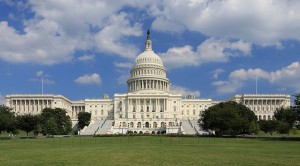On the Hill: AHA Packs the Room at Congressional Briefings

Capitalizing upon last year’s successful congressional briefing on the need for humanist chaplains in the military, the American Humanist Association (AHA) continued its briefing series today by holding events in both the U.S. House and Senate focusing on the current state of international religious freedom and how the human rights of religious minorities and the nonreligious are being threatened. Co-sponsoring the event were our allies: the Center for Inquiry and the Secular Coalition for America.
As the AHA’s lobbyist, I was pleased to work U.S. Senator Tim Kaine (D-VA) and U.S. Rep. Juan Vargas (D-CA) to secure two beautiful rooms in the Senate and House office buildings in which to hold the briefings. Over 125 congressional staffers and interns attended the briefings, representing nearly 100 congressional offices from both the House and the Senate. A list of the offices which attended will be posted online in the near future, as well as an action alert to thank those offices which were able to attend and listen to our concerns.
Just as diverse as the congressional attendance was the speaker lineup at this event, which included government officials as well as representatives of both religious and nonreligious advocacy groups. Panelists included Elizabeth K. Cassidy, deputy director for policy and research at the United States Commission on International Religious Freedom (USCIRF); Tina Ramirez, founder and executive director of Hardwired and former International and Government Relations Director at the Becket Fund for Religious Liberty; Mahmood Ahmad, assistant director of public affairs of the Ahmadiyya Muslim Community USA; and Michael De Dora, director of public policy at the Center for Inquiry and president of the United Nations NGO Committee on Freedom of Religion or Belief.
 The briefing mainly focused on personal narratives of discrimination faced by the impacted groups, such as the tragic case of Bangladeshi-American blogger Avijit Roy, while also highlighting many of the discriminatory laws and policies, such as blasphemy and anti-incitement laws, which discriminate against religious minorities and nontheists. Also discussed at the briefings were actions Congress could take to help remedy the current state of international religious freedom, such as directly contacting foreign governments and advocating for the release of individuals held for religious reasons, or by passing resolutions such as the recently introduced House Resolution 290 which encourages foreign governments to promote religious freedom and repeal blasphemy laws.
The briefing mainly focused on personal narratives of discrimination faced by the impacted groups, such as the tragic case of Bangladeshi-American blogger Avijit Roy, while also highlighting many of the discriminatory laws and policies, such as blasphemy and anti-incitement laws, which discriminate against religious minorities and nontheists. Also discussed at the briefings were actions Congress could take to help remedy the current state of international religious freedom, such as directly contacting foreign governments and advocating for the release of individuals held for religious reasons, or by passing resolutions such as the recently introduced House Resolution 290 which encourages foreign governments to promote religious freedom and repeal blasphemy laws.
That so many staffers from each political party came to our briefings in both the House and the Senate showed us two important things: international religious freedom is truly a bipartisan issue that both parties are genuinely interested in addressing, and the footprint of the humanist movement in our nation’s capital is larger than ever before. By fostering our relationships with members of Congress on both sides of the aisle, the American Humanist Association is in a better position than ever before to impact public policy in a way that upholds humanist values.
Be on the lookout for more humanist congressional briefings on a variety of topics that impact both our community and the nation as a whole. As always, you have a role in ensuring the success of these events. While the AHA will continue to reach out to congressional offices and ask them to attend our briefings, personal requests by constituents just like you are a major factor in ensuring that our briefings remain fully attended—and action is taken.
